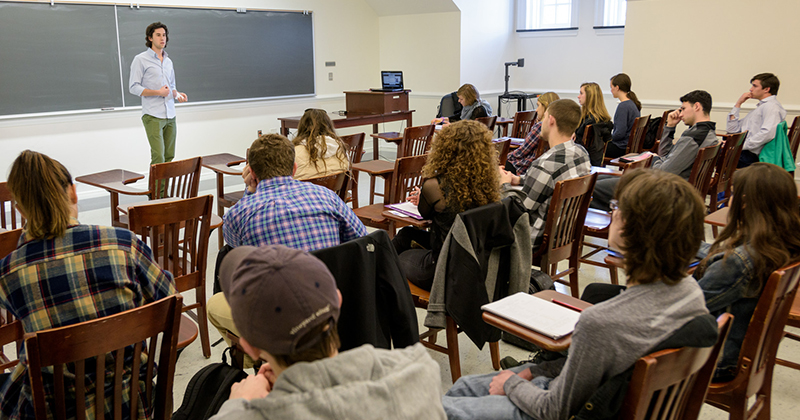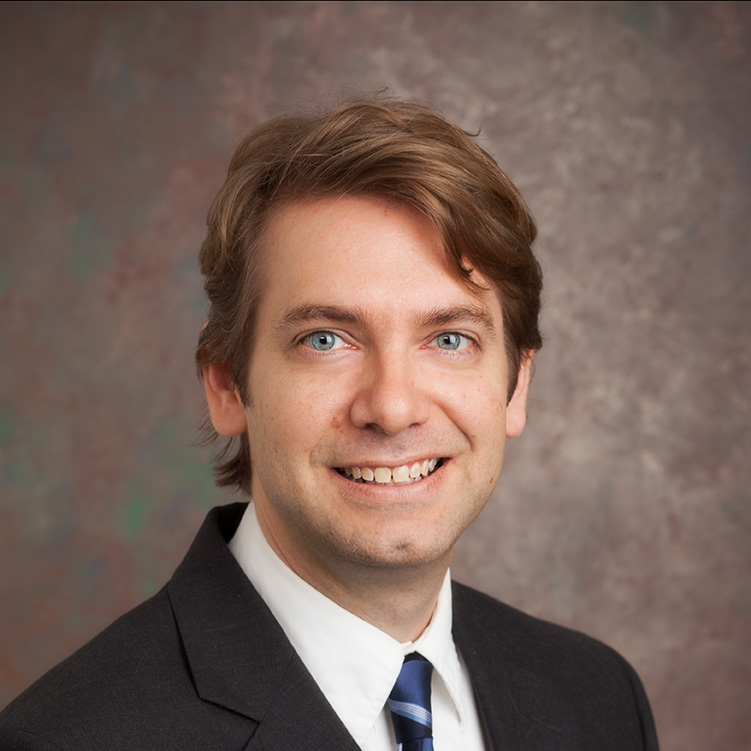
Communication (M.A.)
Welcome to UD's M.A. Program in Communication

The Department of Communication at the University of Delaware offers an in-person, research based master of arts (M.A.) degree that allows students to focus on the field of communication from a social science perspective, while building a program that suits their areas of interest and career goals. Many of our students continue on to earn a Ph.D. in communication. Visit the Frequently Asked Questions page for answers to common inquiries about our research-based programs.
Program Goals
A graduate of the M.A. in communication will be able to:
Articulate the central theories, perspectives, principles, and concepts of the discipline.
Apply communication science theory and methods to conduct research on complex questions and societal problems.
Demonstrate a capacity to communicate research findings to academic and lay audiences.
Incorporate ethical communication principles and practices into their subsequent work environment.
Recognize the cultural basis of communication and acknowledge their own standpoint, with respect for the importance of diversity, equity, and inclusion.
Employ communication strategies to resolve challenges and empower people.
University of Delaware's Department of Communication Graduate Open House: https://capture.udel.edu/media/1_42nnif3g/
Academic Areas of Emphasis
Students in the M.A. program have the flexibility to work with their advisor and the director of graduate studies to tailor their program to their interests. Department of Communication faculty have four key areas of expertise in health communication, interpersonal communication; media communication; and political communication. M.A. students may also take courses in public relations.
Build real-world experience as a teaching assistant
Most (if not all) communication students in full-time graduate programs at the University of Delaware receive financial aid. The financial aid package may include a teaching assistantship.
The teaching assistantships provide graduate students with real-world teaching experience, which is attractive both to doctoral programs and to professional organizations. They receive more in-classroom experience as the sole instructor than most other graduate programs — including doctoral programs.
Teaching Assistants (TAs) receive a tuition scholarship for courses taken during fall and spring semesters as well as a stipend. The teaching assistantship is renewed for the second year of study provided that the TA remains in good academic standing (GPA of 3.0) and otherwise performs their TA duties in an appropriate manner.
The TAs teach "Oral Communication in Business," a public speaking course for non-communication undergraduate majors. Each TA is responsible for stand-alone classroom instruction and grading for their assigned sections.
During the first semester of their first year of study, TAs teach one section of this course. In all subsequent semesters, TAs teach two sections of this course. Second-year TAs serve as peer mentors to first-year TAs.
Guided by a core curriculum, TAs develop their own lecture materials, activities, and multimedia presentations — preparing them future academic or professional teaching opportunities.
The training focuses on best practices of teaching strategies; practical, hands on course development; as well as learning how to teach both theory and the practical aspects of communication (public speaking).
All TAs meet daily with the Oral Communication course director the week prior to the start of the semester for in-depth training. After their classes are underway, TAs meet weekly throughout the year to continue their development as instructors.
The weekly meetings with the course director allow the TAs to discuss pedagogy and teaching strategies as well as any other concerns they may have with their classroom experiences. Each semester, TAs are observed by the course director and a peer mentor, and receive a review of their classroom practices.
Second-year TAs can teach specialized sections focused on scientific and technical communication or business and professional speaking. Additionally, one student each semester serves as the assistant course coordinator to review course materials, teaching strategies and training sessions with the Oral Communication course director.
Two Tracks Available for the M.A. Degree
The Department of Communication offers two alternative tracks for obtaining the M.A. degree. Students should declare their intention to pursue one of these tracks by the end of the first year of their M.A. program.
The department's graduate program policy statement specifies degree requirements, policies, and procedures for communication graduate students. The statements are reviewed and approved by the Faculty Senate's Graduate Studies Committee. Visit the UD Graduate Catalog to review the M.A. and Ph.D. degree requirements.
Thesis track: For students focused on scholarly social science research, generally in preparation for further graduate study at the doctoral level. The thesis typically is a research project in an area of interest to the student, employing social science methodology and analyses.
Comprehensive exam: For students who intend to use their social science research skills in settings other than academia. The comprehensive exam covers the entirety of the student's coursework, including the student's specialty area, and consists of both a written and an oral portion.
Students in both the thesis and comprehensive exam tracks work with a faculty committee made up of a primary faculty advisor and two additional faculty members who provide students with close faculty supervision and mentorship on their exit project.
Program Structure
Thirty credit hours are required to complete the M.A. degree:
Twelve credit hours of core curricula, including six credits of theory courses, three credits of research methodology, and three credits of statistical methodology.
COMM 601 – Theory and Epistemology in Communication
COMM 603 – Communication Research Methods – Procedures
COMM 604 – Communication Research Methods – Analysis
COMM 606 – Foundations of Contemporary Communication Theory
Eighteen additional credit hours are required. The composition of these credits will differ based on whether you are in a thesis or comprehensive exam track.
Thesis track: Students in the thesis track will have twelve credit hours of electives and six credits of COMM 869, Master’s Thesis
Comprehensive exam track: Students in the comprehensive exam track will have eighteen hours of elective credit.
In either track, up to six of the elective credit hours may be taken outside of the Department of Communication in a related area of study with permission of the Director of Graduate Studies.
Students must enroll in the Communication Colloquium series every semester they are enrolled in coursework for a total of up to four semesters.
Thesis chair and committee selection
Students will select a thesis chair with approval from their academic advisor (who is usually the same individual) and with approval of the Department of Communication's graduate committee. The student and their thesis chair will create a dissertation committee at the time the student begins to develop the thesis proposal. The thesis committee will include two additional faculty members from within the Department of Communication's graduate faculty. All M.A. thesis committee members must hold a doctoral degree. Students must complete a Thesis Committee Form and submit it to the Department of Communication's graduate program coordinator, who will forward it to the Graduate College.
Defense of the thesis proposal
A copy of the thesis proposal must be available to the student’s thesis committee members at least two weeks in advance of the proposal defense. The thesis proposal defense will be scheduled only after the student’s advisor has determined that a defense is appropriate. Once the oral defense of the proposal is finished, the M.A.Thesis Proposal Committee Meeting form must be completed, signed by all committee members, and submitted to the Department of Communication's graduate program coordinator.
Defense of the thesis
The format of the thesis must adhere to the guidelines specified by the University's Thesis and Dissertation Manual.
Prior to scheduling a defense, the candidate must use iThenticate, the university-provided plagiarism detection software, to check their work. The advisor and the director of graduate studies should receive a copy of the iThenticate report prior to submitting the final thesis draft.
The thesis defense will be scheduled only after the candidate’s advisor has determined that a defense is appropriate. A copy of the thesis must be made available to thesis committee members at least two weeks prior to the thesis defense. After a successful defense with the thesis committee, the thesis must be approved by the thesis chair, the chairperson of the Department of Communication, the dean of the College of Arts and Sciences, and the dean of the Graduate College.
After the oral defense of the thesis is achieved, the M.A. Oral Defense of the Thesis Form must be completed, signed by all committee members, and a PDF of the final thesis must be submitted to the Department of Communication's graduate program coordinator, who will forward it to the Graduate College.
Comprehensive exam chair and committee selection
Students will select a comprehensive exam chair with approval from their academic advisor (who is usually the same individual) and with approval of the Department of Communication's Graduate Committee. The student and their exam chair will select faculty members from within the Department of Communication's graduate faculty to make up the comprehensive exam committee. All M.A. comprehensive exam committee members must hold a doctoral degree. Students must complete an M.A. Comprehensive Exams Committee Form and submit it to the Department of Communication's graduate program coordinator.
Substance of the M.A. comprehensive exams
The comprehensive exam covers the entirety of the student's coursework, including the student's specialty area. It will not cover new material except as needed to bolster the specialty area. It consists of both a written and oral portion.
There will be three separate written exam sessions, to be taken during the two weeks following spring break in the student’s second year. Each written exam session will be two hours long. The exam is taken in-person, using a Department of Communication laptop. The three exam sessions will focus on:
Theory
Research methodology and statistics
The student’s specialty area
Generally, each faculty member on the committee is responsible for writing the questions for one of the three sessions. Committee members should be selected with this in mind.
If the student does not pass one or more written sections of the comprehensive exam, these sections may be rewritten prior to the oral exam. Only one repeat written examination will be permitted.
The oral defense of the comprehensive exam is held as soon as possible after the student has successfully completed the written portion, and provides an arena for the student to answer any additional questions of committee members.
Once the oral defense is complete, the M.A. Comprehensive Exams Oral Defense Form must be signed by all members of the committee and submitted to the Department of Communication's graduate program coordinator, who will forward it to the Graduate College.
Visit the Graduate College's Academic Support page under "Forms" for academic and graduation forms including:
- Application for advanced degree
- Course substitution
- Request for transfer of graduate credit
- Change of major/concentration
- Recommendation for candidacy
- Dissertation defense form
- Dissertation defense certification
- Thesis/dissertation manual
- Dissertation candidacy recommendation form
- Request to change dissertation committee

